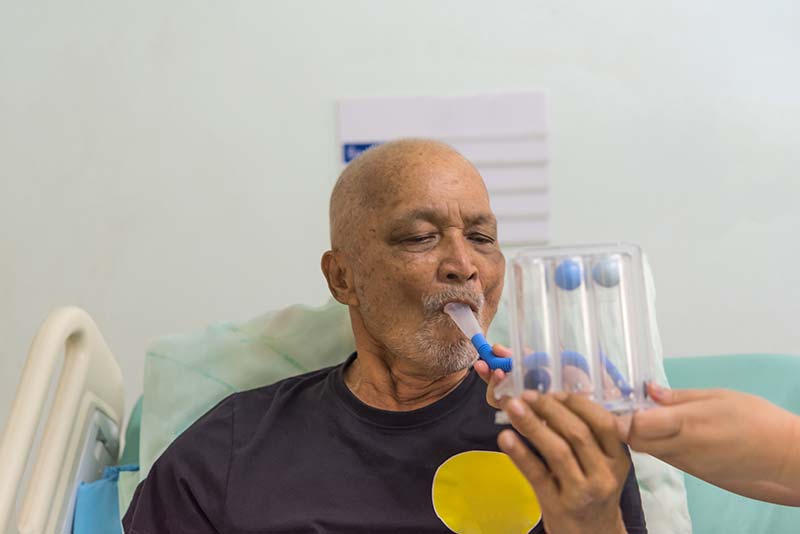Nonspecific interstitial pneumonia, or NSIP, is a type of interstitial lung disease that causes inflammation in different parts of the lung. It is often related to autoimmune disease but can also have an unknown cause or be cryptogenic.
This condition causes the tissue around the tiny air sacs in the lungs to become inflamed. The air sacs, called alveoli, are very important to lung function because they move oxygen and carbon dioxide into and out of your bloodstream.
If NSIP goes undiagnosed or is left untreated, this inflammation can lead to permanent scarring and lung damage. That’s why it’s important to see the pulmonary experts at The Ohio State University Wexner Medical Center when dealing with nonspecific interstitial pneumonia.
 Not only do we have providers with years of experience specializing in complex interstitial lung diseases (ILD), but we also have a whole program dedicated to the research and treatment of various ILD conditions. We’ll provide you with the comprehensive and personalized care needed to improve your quality of life while dealing with this form of pneumonia.
Not only do we have providers with years of experience specializing in complex interstitial lung diseases (ILD), but we also have a whole program dedicated to the research and treatment of various ILD conditions. We’ll provide you with the comprehensive and personalized care needed to improve your quality of life while dealing with this form of pneumonia.
Nonspecific interstitial pneumonia causes
Pneumonia typically refers to lung inflammation from any cause; however, nonspecific interstitial pneumonia occurs for reasons other than infection.
Oftentimes with NSIP, we don’t know the cause.
People with this disease tend to be young (40s and 50s) females.
Nonspecific interstitial pneumonia symptoms
Symptoms of NSIP are similar to those of other respiratory disorders, so it’s important to have a physician evaluate them to make an accurate diagnosis.
Hallmarks of the disease include difficulty breathing and a cough.
Other symptoms include:
- Shortness of breath, either with activity or without, as the disease progresses
- A dry cough
- Fatigue
- Dyspnea (labored breathing)
- Other autoimmune symptoms, such as rashes, joint pain or dry mouth and eyes
Diagnosing nonspecific interstitial pneumonia
Because its cause is usually unknown and symptoms are general, it can be difficult to diagnose nonspecific interstitial pneumonia. A lung biopsy may be required for a confident diagnosis.
As we rule out other conditions as the reason for your shortness of breath and cough, we’ll run a variety of medical tests to help us narrow down a diagnosis. Those tests include:
- Blood tests
- Bronchoscopy
- Lung function tests, like spirometry and oximetry
- Chest X-rays and CT scans
- Lung biopsy
High-resolution images of the chest, like those provided by a CT scan, are helpful in diagnosing NSIP, because those with this condition typically exhibit a “ground glass” pattern in their lungs that signifies interstitial inflammation.
What are the treatment options for nonspecific interstitial pneumonia?
Some people with nonspecific interstitial pneumonia will respond to corticosteroids, like prednisone, especially if treatment is begun early. Others may not. In some cases, immune-suppressing drugs may be necessary long term.
If the cause of the pneumonia is thought to be an autoimmune disease, we’ll need to work to better manage that condition with frequent monitoring and other treatments coordinated with your rheumatologist. If you don’t have a rheumatologist, we can provide a referral to our world-renowned experts.
For those who have scarring, or fibrosis, due to NSIP, there may be a role for anti-fibrotic medications. We can also offer oxygen treatments or pulmonary rehabilitation to anyone suffering from NSIP, and as a lung transplant center, can assess this type of care for people who may be candidates for it.

